Reflective Report on New Enterprise Venture Development - MD4060
VerifiedAdded on 2023/04/21
|9
|1450
|222
Report
AI Summary
This report presents a personal reflection on the MD4060 module, New Enterprise and Venture Development, utilizing Kolb's Reflective Cycle to analyze the experience. The reflection covers a group consultancy project focused on Preston Market, including the formation and organization of the group, the selection of the host organization, and the challenges faced in building relationships with clients. The report details the skills learned, such as relationship building, effective communication, analysis, time management, and group coordination. It concludes with a plan for future application of these skills, including improved task scheduling, communication strategies, and recommendations for the host organization to renovate the market and expand its business model.
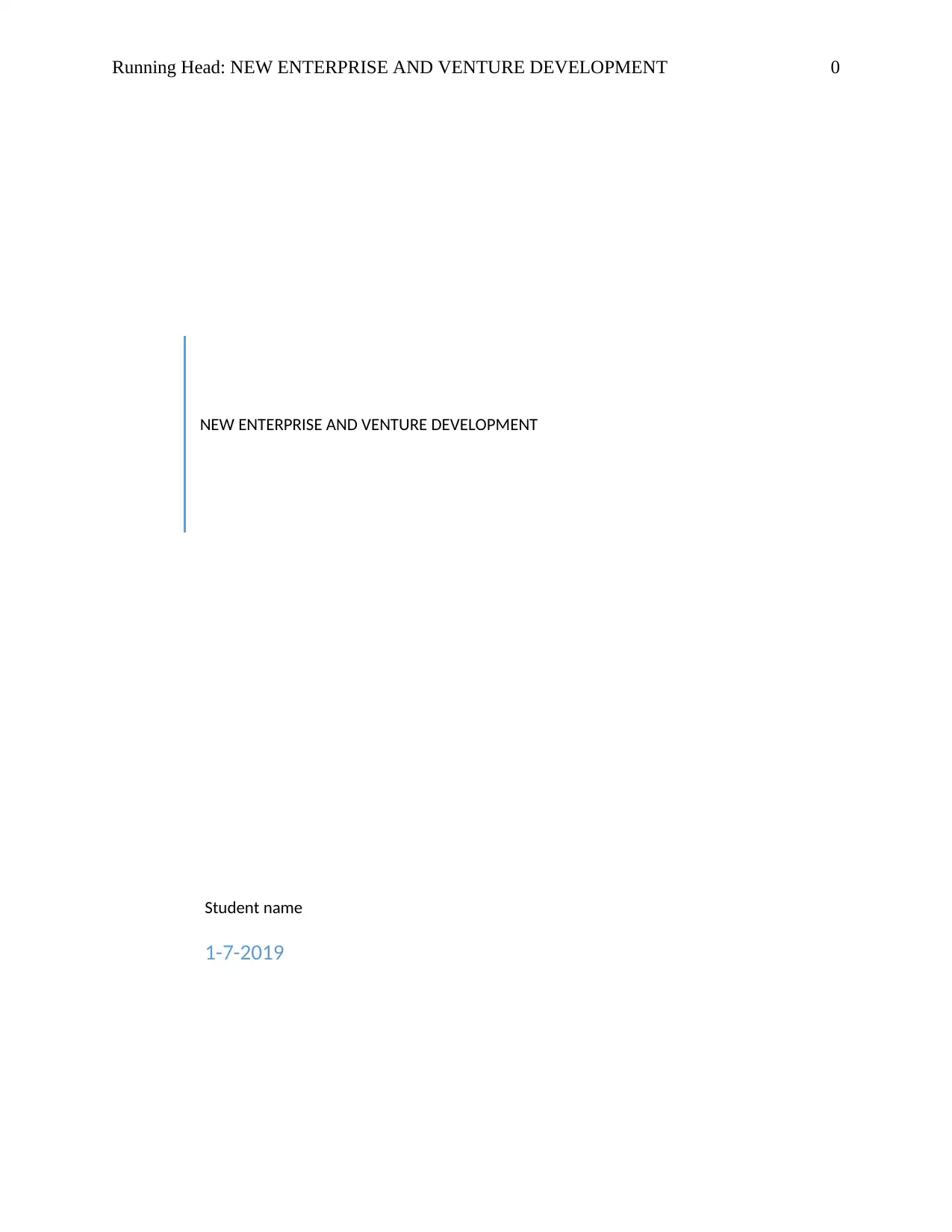
Running Head: NEW ENTERPRISE AND VENTURE DEVELOPMENT 0
NEW ENTERPRISE AND VENTURE DEVELOPMENT
Student name
1-7-2019
NEW ENTERPRISE AND VENTURE DEVELOPMENT
Student name
1-7-2019
Paraphrase This Document
Need a fresh take? Get an instant paraphrase of this document with our AI Paraphraser
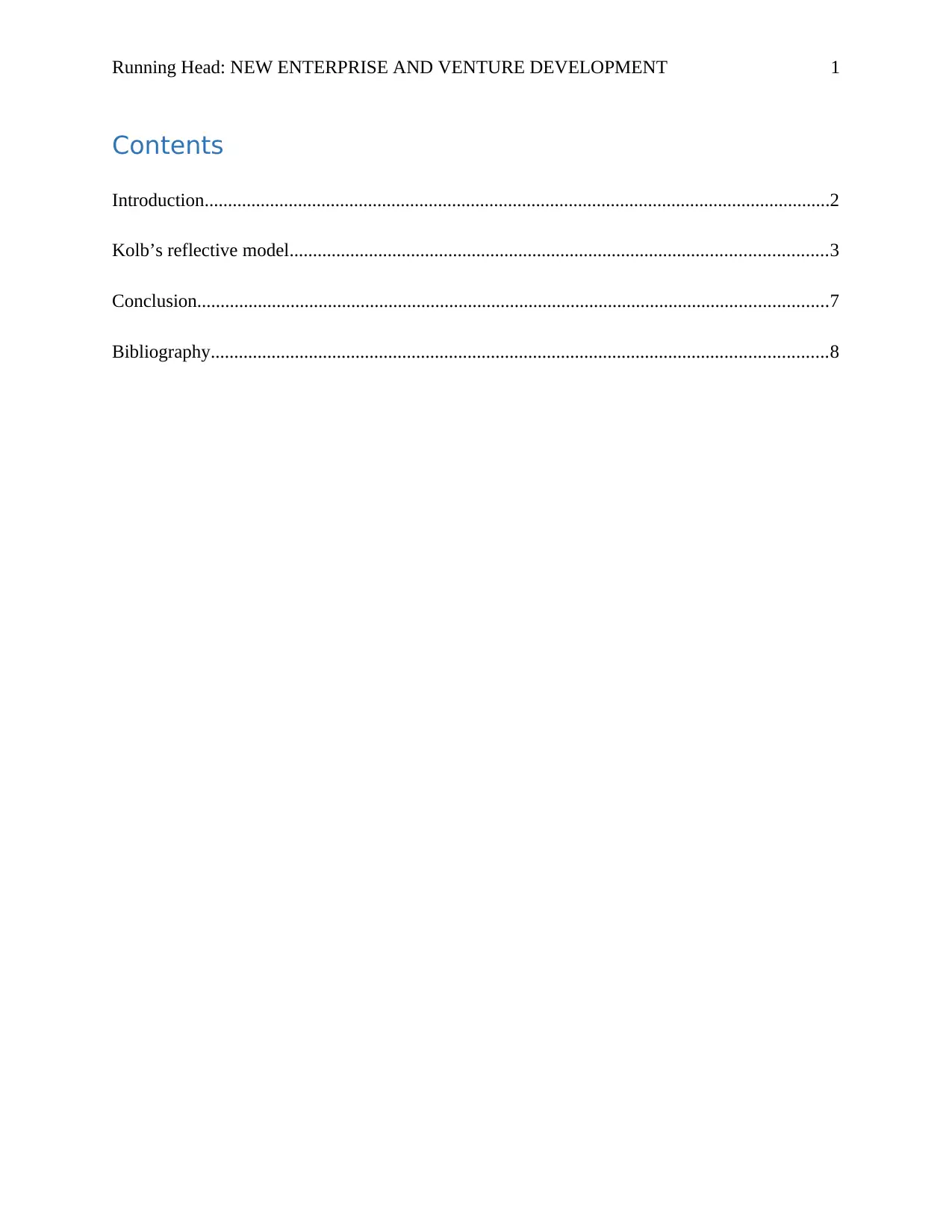
Running Head: NEW ENTERPRISE AND VENTURE DEVELOPMENT 1
Contents
Introduction......................................................................................................................................2
Kolb’s reflective model...................................................................................................................3
Conclusion.......................................................................................................................................7
Bibliography....................................................................................................................................8
Contents
Introduction......................................................................................................................................2
Kolb’s reflective model...................................................................................................................3
Conclusion.......................................................................................................................................7
Bibliography....................................................................................................................................8
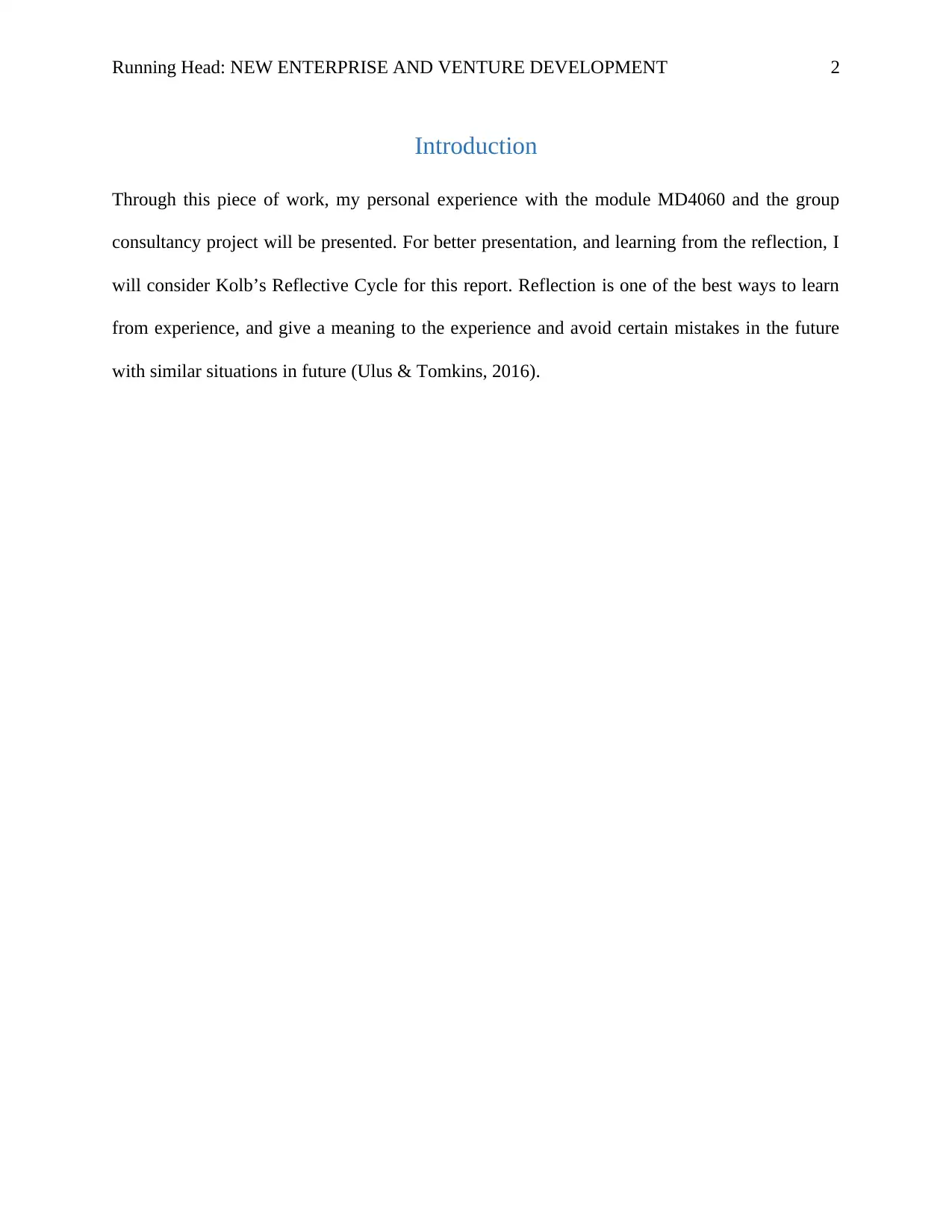
Running Head: NEW ENTERPRISE AND VENTURE DEVELOPMENT 2
Introduction
Through this piece of work, my personal experience with the module MD4060 and the group
consultancy project will be presented. For better presentation, and learning from the reflection, I
will consider Kolb’s Reflective Cycle for this report. Reflection is one of the best ways to learn
from experience, and give a meaning to the experience and avoid certain mistakes in the future
with similar situations in future (Ulus & Tomkins, 2016).
Introduction
Through this piece of work, my personal experience with the module MD4060 and the group
consultancy project will be presented. For better presentation, and learning from the reflection, I
will consider Kolb’s Reflective Cycle for this report. Reflection is one of the best ways to learn
from experience, and give a meaning to the experience and avoid certain mistakes in the future
with similar situations in future (Ulus & Tomkins, 2016).
⊘ This is a preview!⊘
Do you want full access?
Subscribe today to unlock all pages.

Trusted by 1+ million students worldwide
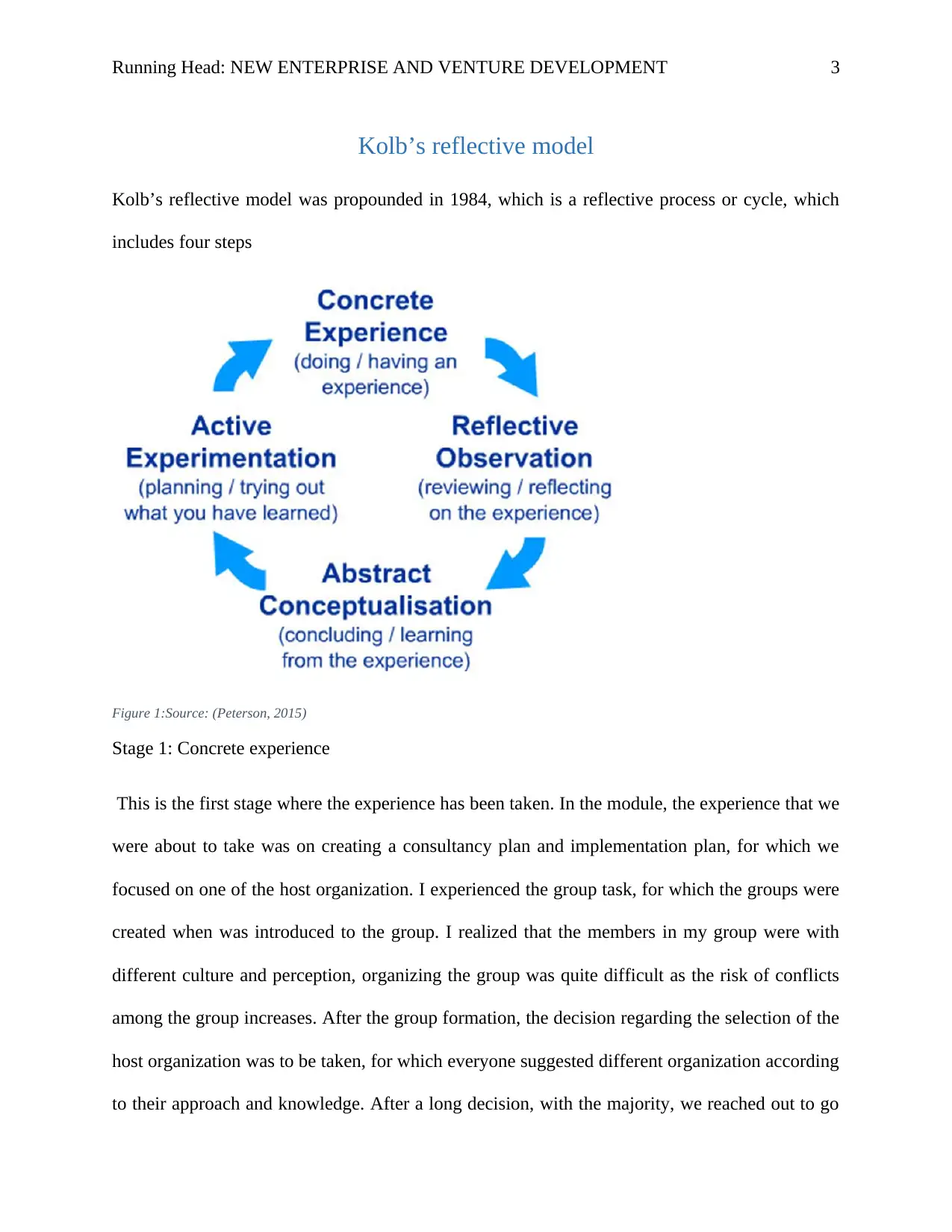
Running Head: NEW ENTERPRISE AND VENTURE DEVELOPMENT 3
Kolb’s reflective model
Kolb’s reflective model was propounded in 1984, which is a reflective process or cycle, which
includes four steps
Figure 1:Source: (Peterson, 2015)
Stage 1: Concrete experience
This is the first stage where the experience has been taken. In the module, the experience that we
were about to take was on creating a consultancy plan and implementation plan, for which we
focused on one of the host organization. I experienced the group task, for which the groups were
created when was introduced to the group. I realized that the members in my group were with
different culture and perception, organizing the group was quite difficult as the risk of conflicts
among the group increases. After the group formation, the decision regarding the selection of the
host organization was to be taken, for which everyone suggested different organization according
to their approach and knowledge. After a long decision, with the majority, we reached out to go
Kolb’s reflective model
Kolb’s reflective model was propounded in 1984, which is a reflective process or cycle, which
includes four steps
Figure 1:Source: (Peterson, 2015)
Stage 1: Concrete experience
This is the first stage where the experience has been taken. In the module, the experience that we
were about to take was on creating a consultancy plan and implementation plan, for which we
focused on one of the host organization. I experienced the group task, for which the groups were
created when was introduced to the group. I realized that the members in my group were with
different culture and perception, organizing the group was quite difficult as the risk of conflicts
among the group increases. After the group formation, the decision regarding the selection of the
host organization was to be taken, for which everyone suggested different organization according
to their approach and knowledge. After a long decision, with the majority, we reached out to go
Paraphrase This Document
Need a fresh take? Get an instant paraphrase of this document with our AI Paraphraser
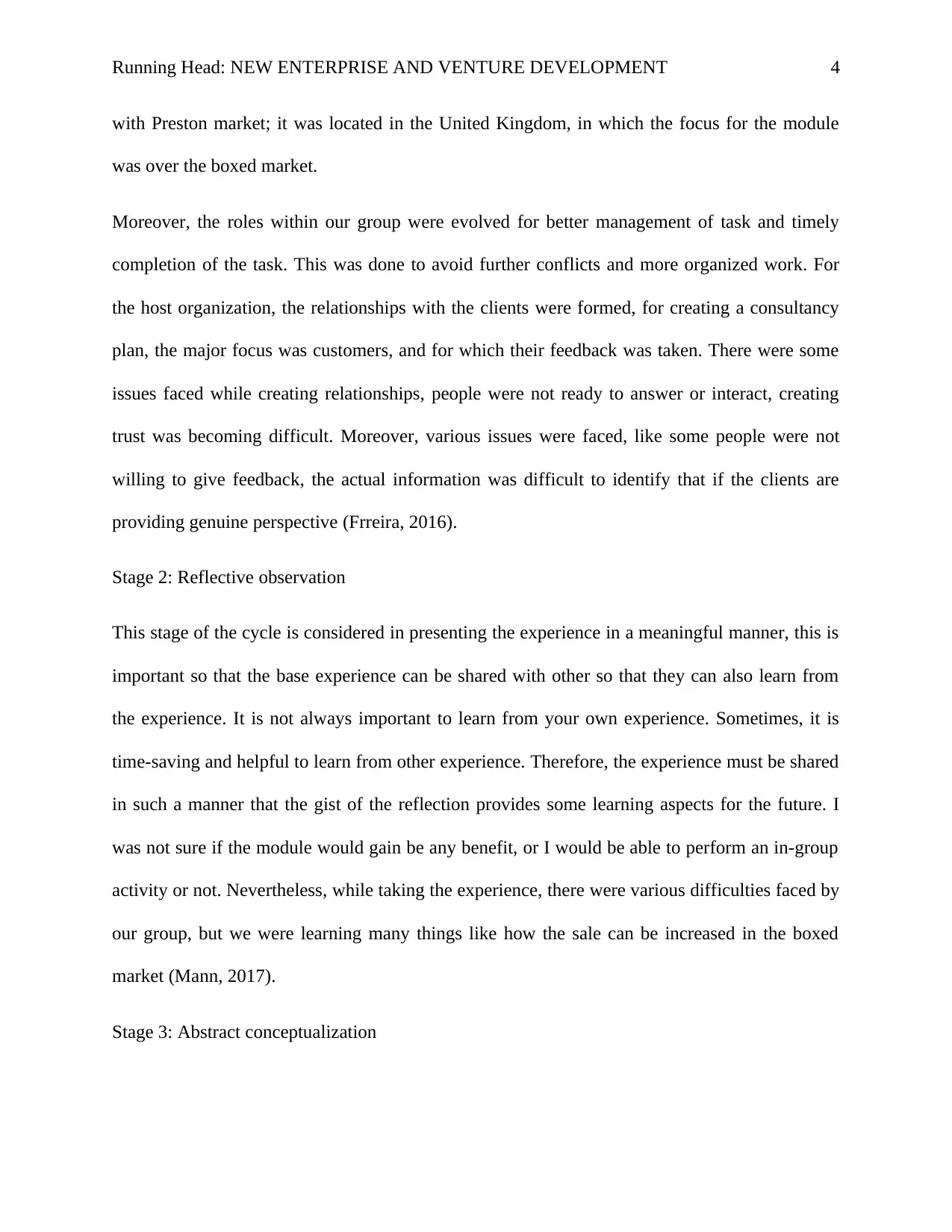
Running Head: NEW ENTERPRISE AND VENTURE DEVELOPMENT 4
with Preston market; it was located in the United Kingdom, in which the focus for the module
was over the boxed market.
Moreover, the roles within our group were evolved for better management of task and timely
completion of the task. This was done to avoid further conflicts and more organized work. For
the host organization, the relationships with the clients were formed, for creating a consultancy
plan, the major focus was customers, and for which their feedback was taken. There were some
issues faced while creating relationships, people were not ready to answer or interact, creating
trust was becoming difficult. Moreover, various issues were faced, like some people were not
willing to give feedback, the actual information was difficult to identify that if the clients are
providing genuine perspective (Frreira, 2016).
Stage 2: Reflective observation
This stage of the cycle is considered in presenting the experience in a meaningful manner, this is
important so that the base experience can be shared with other so that they can also learn from
the experience. It is not always important to learn from your own experience. Sometimes, it is
time-saving and helpful to learn from other experience. Therefore, the experience must be shared
in such a manner that the gist of the reflection provides some learning aspects for the future. I
was not sure if the module would gain be any benefit, or I would be able to perform an in-group
activity or not. Nevertheless, while taking the experience, there were various difficulties faced by
our group, but we were learning many things like how the sale can be increased in the boxed
market (Mann, 2017).
Stage 3: Abstract conceptualization
with Preston market; it was located in the United Kingdom, in which the focus for the module
was over the boxed market.
Moreover, the roles within our group were evolved for better management of task and timely
completion of the task. This was done to avoid further conflicts and more organized work. For
the host organization, the relationships with the clients were formed, for creating a consultancy
plan, the major focus was customers, and for which their feedback was taken. There were some
issues faced while creating relationships, people were not ready to answer or interact, creating
trust was becoming difficult. Moreover, various issues were faced, like some people were not
willing to give feedback, the actual information was difficult to identify that if the clients are
providing genuine perspective (Frreira, 2016).
Stage 2: Reflective observation
This stage of the cycle is considered in presenting the experience in a meaningful manner, this is
important so that the base experience can be shared with other so that they can also learn from
the experience. It is not always important to learn from your own experience. Sometimes, it is
time-saving and helpful to learn from other experience. Therefore, the experience must be shared
in such a manner that the gist of the reflection provides some learning aspects for the future. I
was not sure if the module would gain be any benefit, or I would be able to perform an in-group
activity or not. Nevertheless, while taking the experience, there were various difficulties faced by
our group, but we were learning many things like how the sale can be increased in the boxed
market (Mann, 2017).
Stage 3: Abstract conceptualization
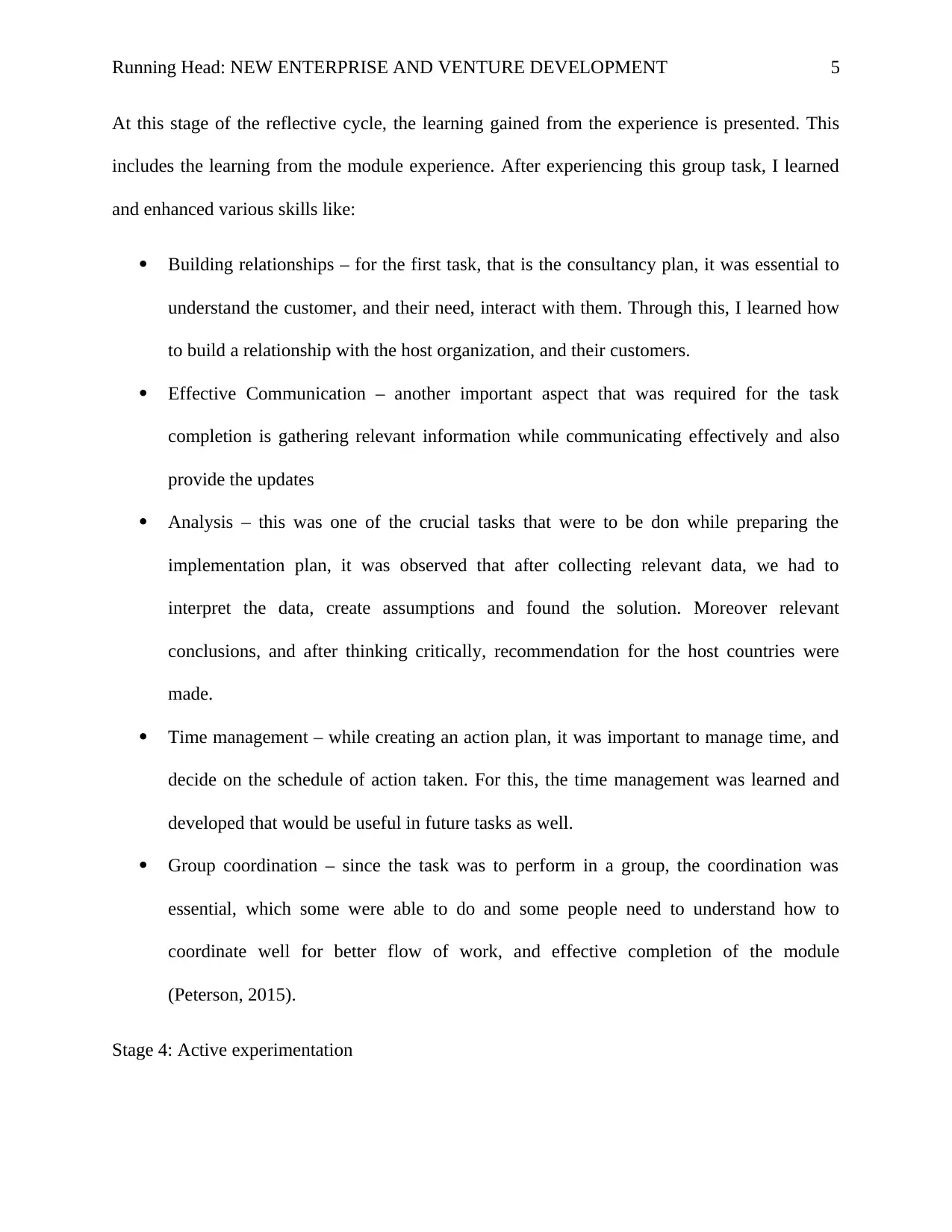
Running Head: NEW ENTERPRISE AND VENTURE DEVELOPMENT 5
At this stage of the reflective cycle, the learning gained from the experience is presented. This
includes the learning from the module experience. After experiencing this group task, I learned
and enhanced various skills like:
Building relationships – for the first task, that is the consultancy plan, it was essential to
understand the customer, and their need, interact with them. Through this, I learned how
to build a relationship with the host organization, and their customers.
Effective Communication – another important aspect that was required for the task
completion is gathering relevant information while communicating effectively and also
provide the updates
Analysis – this was one of the crucial tasks that were to be don while preparing the
implementation plan, it was observed that after collecting relevant data, we had to
interpret the data, create assumptions and found the solution. Moreover relevant
conclusions, and after thinking critically, recommendation for the host countries were
made.
Time management – while creating an action plan, it was important to manage time, and
decide on the schedule of action taken. For this, the time management was learned and
developed that would be useful in future tasks as well.
Group coordination – since the task was to perform in a group, the coordination was
essential, which some were able to do and some people need to understand how to
coordinate well for better flow of work, and effective completion of the module
(Peterson, 2015).
Stage 4: Active experimentation
At this stage of the reflective cycle, the learning gained from the experience is presented. This
includes the learning from the module experience. After experiencing this group task, I learned
and enhanced various skills like:
Building relationships – for the first task, that is the consultancy plan, it was essential to
understand the customer, and their need, interact with them. Through this, I learned how
to build a relationship with the host organization, and their customers.
Effective Communication – another important aspect that was required for the task
completion is gathering relevant information while communicating effectively and also
provide the updates
Analysis – this was one of the crucial tasks that were to be don while preparing the
implementation plan, it was observed that after collecting relevant data, we had to
interpret the data, create assumptions and found the solution. Moreover relevant
conclusions, and after thinking critically, recommendation for the host countries were
made.
Time management – while creating an action plan, it was important to manage time, and
decide on the schedule of action taken. For this, the time management was learned and
developed that would be useful in future tasks as well.
Group coordination – since the task was to perform in a group, the coordination was
essential, which some were able to do and some people need to understand how to
coordinate well for better flow of work, and effective completion of the module
(Peterson, 2015).
Stage 4: Active experimentation
⊘ This is a preview!⊘
Do you want full access?
Subscribe today to unlock all pages.

Trusted by 1+ million students worldwide
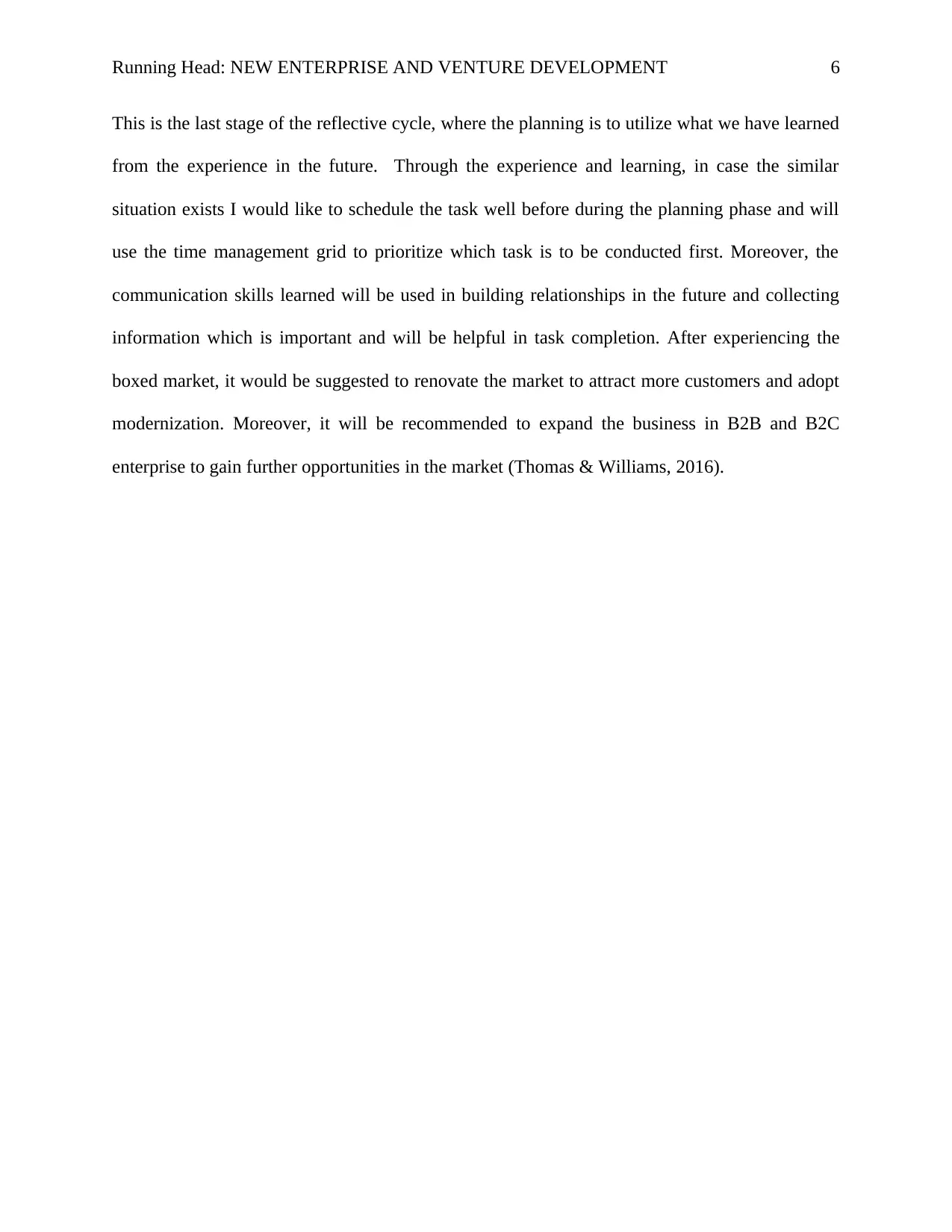
Running Head: NEW ENTERPRISE AND VENTURE DEVELOPMENT 6
This is the last stage of the reflective cycle, where the planning is to utilize what we have learned
from the experience in the future. Through the experience and learning, in case the similar
situation exists I would like to schedule the task well before during the planning phase and will
use the time management grid to prioritize which task is to be conducted first. Moreover, the
communication skills learned will be used in building relationships in the future and collecting
information which is important and will be helpful in task completion. After experiencing the
boxed market, it would be suggested to renovate the market to attract more customers and adopt
modernization. Moreover, it will be recommended to expand the business in B2B and B2C
enterprise to gain further opportunities in the market (Thomas & Williams, 2016).
This is the last stage of the reflective cycle, where the planning is to utilize what we have learned
from the experience in the future. Through the experience and learning, in case the similar
situation exists I would like to schedule the task well before during the planning phase and will
use the time management grid to prioritize which task is to be conducted first. Moreover, the
communication skills learned will be used in building relationships in the future and collecting
information which is important and will be helpful in task completion. After experiencing the
boxed market, it would be suggested to renovate the market to attract more customers and adopt
modernization. Moreover, it will be recommended to expand the business in B2B and B2C
enterprise to gain further opportunities in the market (Thomas & Williams, 2016).
Paraphrase This Document
Need a fresh take? Get an instant paraphrase of this document with our AI Paraphraser
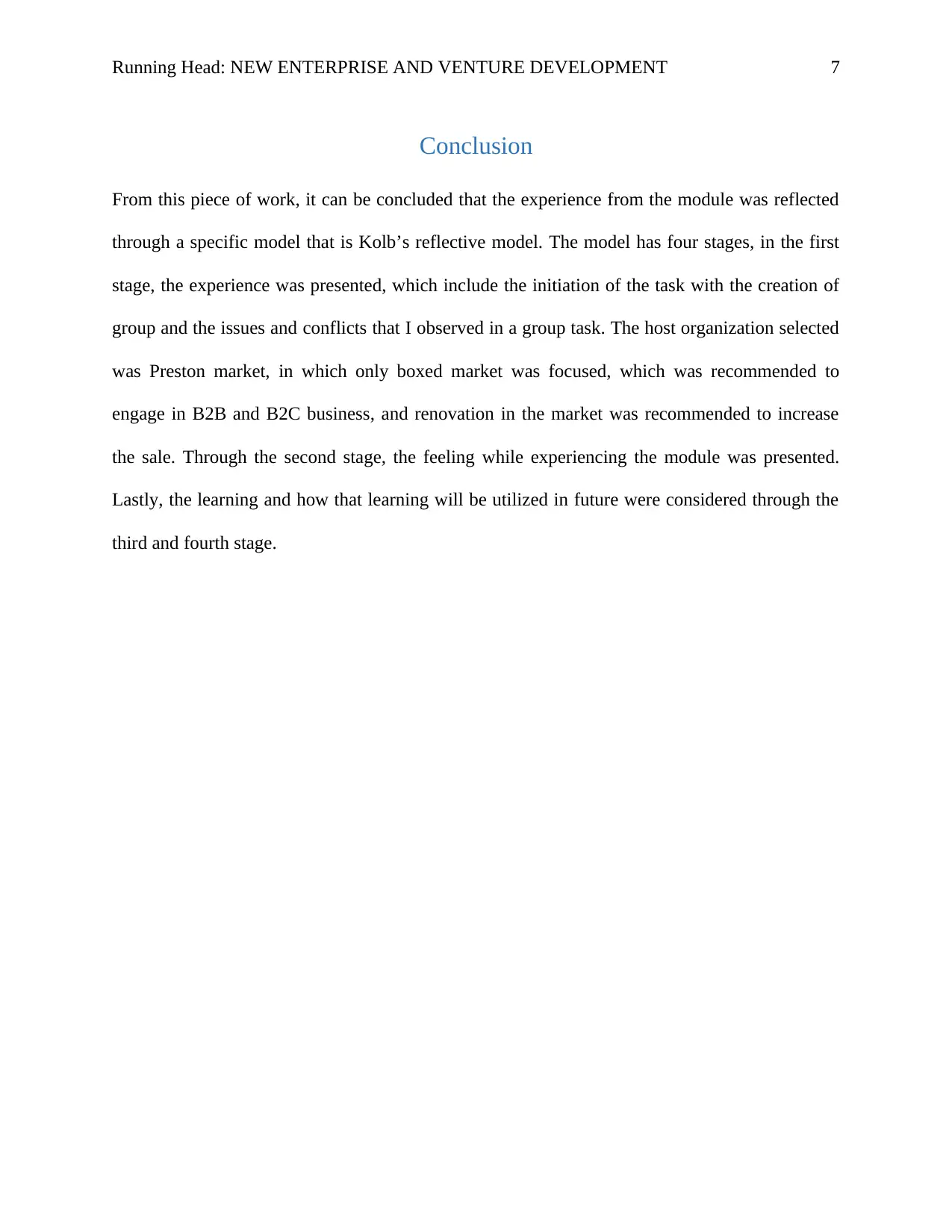
Running Head: NEW ENTERPRISE AND VENTURE DEVELOPMENT 7
Conclusion
From this piece of work, it can be concluded that the experience from the module was reflected
through a specific model that is Kolb’s reflective model. The model has four stages, in the first
stage, the experience was presented, which include the initiation of the task with the creation of
group and the issues and conflicts that I observed in a group task. The host organization selected
was Preston market, in which only boxed market was focused, which was recommended to
engage in B2B and B2C business, and renovation in the market was recommended to increase
the sale. Through the second stage, the feeling while experiencing the module was presented.
Lastly, the learning and how that learning will be utilized in future were considered through the
third and fourth stage.
Conclusion
From this piece of work, it can be concluded that the experience from the module was reflected
through a specific model that is Kolb’s reflective model. The model has four stages, in the first
stage, the experience was presented, which include the initiation of the task with the creation of
group and the issues and conflicts that I observed in a group task. The host organization selected
was Preston market, in which only boxed market was focused, which was recommended to
engage in B2B and B2C business, and renovation in the market was recommended to increase
the sale. Through the second stage, the feeling while experiencing the module was presented.
Lastly, the learning and how that learning will be utilized in future were considered through the
third and fourth stage.
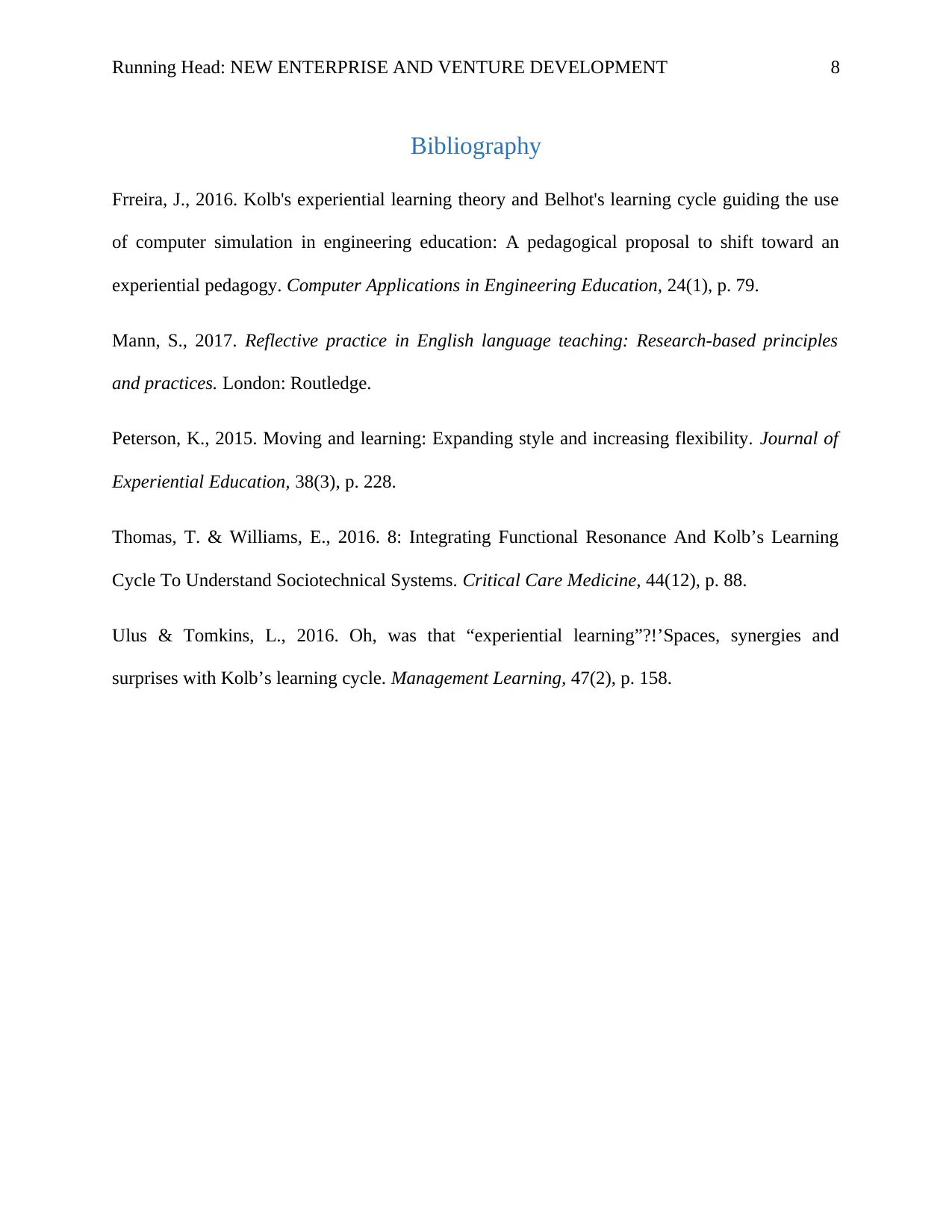
Running Head: NEW ENTERPRISE AND VENTURE DEVELOPMENT 8
Bibliography
Frreira, J., 2016. Kolb's experiential learning theory and Belhot's learning cycle guiding the use
of computer simulation in engineering education: A pedagogical proposal to shift toward an
experiential pedagogy. Computer Applications in Engineering Education, 24(1), p. 79.
Mann, S., 2017. Reflective practice in English language teaching: Research-based principles
and practices. London: Routledge.
Peterson, K., 2015. Moving and learning: Expanding style and increasing flexibility. Journal of
Experiential Education, 38(3), p. 228.
Thomas, T. & Williams, E., 2016. 8: Integrating Functional Resonance And Kolb’s Learning
Cycle To Understand Sociotechnical Systems. Critical Care Medicine, 44(12), p. 88.
Ulus & Tomkins, L., 2016. Oh, was that “experiential learning”?!’Spaces, synergies and
surprises with Kolb’s learning cycle. Management Learning, 47(2), p. 158.
Bibliography
Frreira, J., 2016. Kolb's experiential learning theory and Belhot's learning cycle guiding the use
of computer simulation in engineering education: A pedagogical proposal to shift toward an
experiential pedagogy. Computer Applications in Engineering Education, 24(1), p. 79.
Mann, S., 2017. Reflective practice in English language teaching: Research-based principles
and practices. London: Routledge.
Peterson, K., 2015. Moving and learning: Expanding style and increasing flexibility. Journal of
Experiential Education, 38(3), p. 228.
Thomas, T. & Williams, E., 2016. 8: Integrating Functional Resonance And Kolb’s Learning
Cycle To Understand Sociotechnical Systems. Critical Care Medicine, 44(12), p. 88.
Ulus & Tomkins, L., 2016. Oh, was that “experiential learning”?!’Spaces, synergies and
surprises with Kolb’s learning cycle. Management Learning, 47(2), p. 158.
⊘ This is a preview!⊘
Do you want full access?
Subscribe today to unlock all pages.

Trusted by 1+ million students worldwide
1 out of 9
Related Documents
Your All-in-One AI-Powered Toolkit for Academic Success.
+13062052269
info@desklib.com
Available 24*7 on WhatsApp / Email
![[object Object]](/_next/static/media/star-bottom.7253800d.svg)
Unlock your academic potential
Copyright © 2020–2026 A2Z Services. All Rights Reserved. Developed and managed by ZUCOL.





